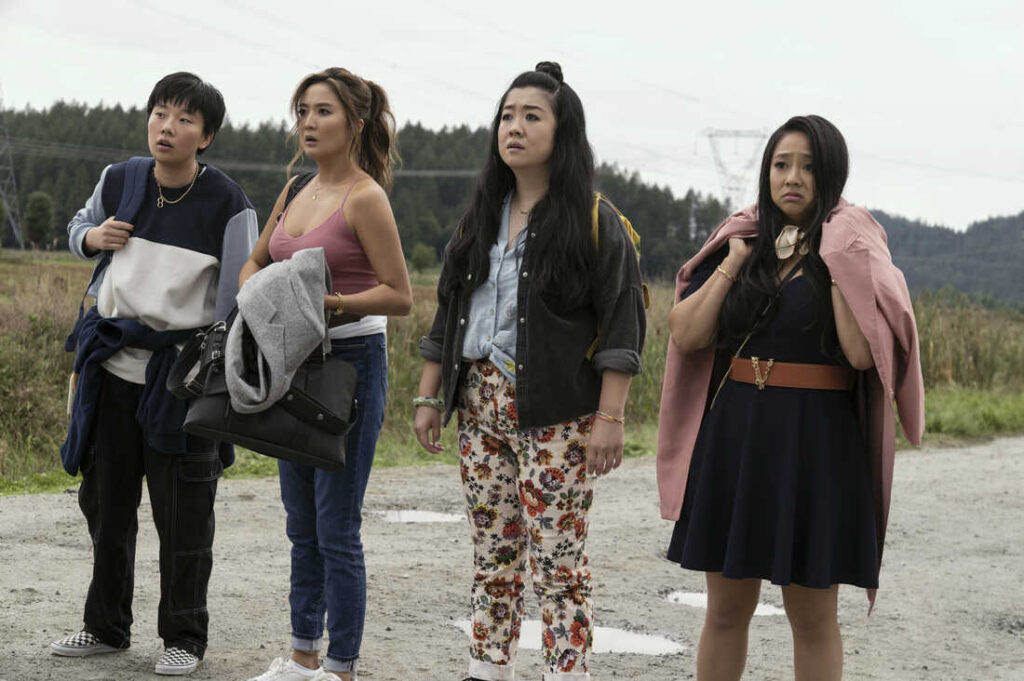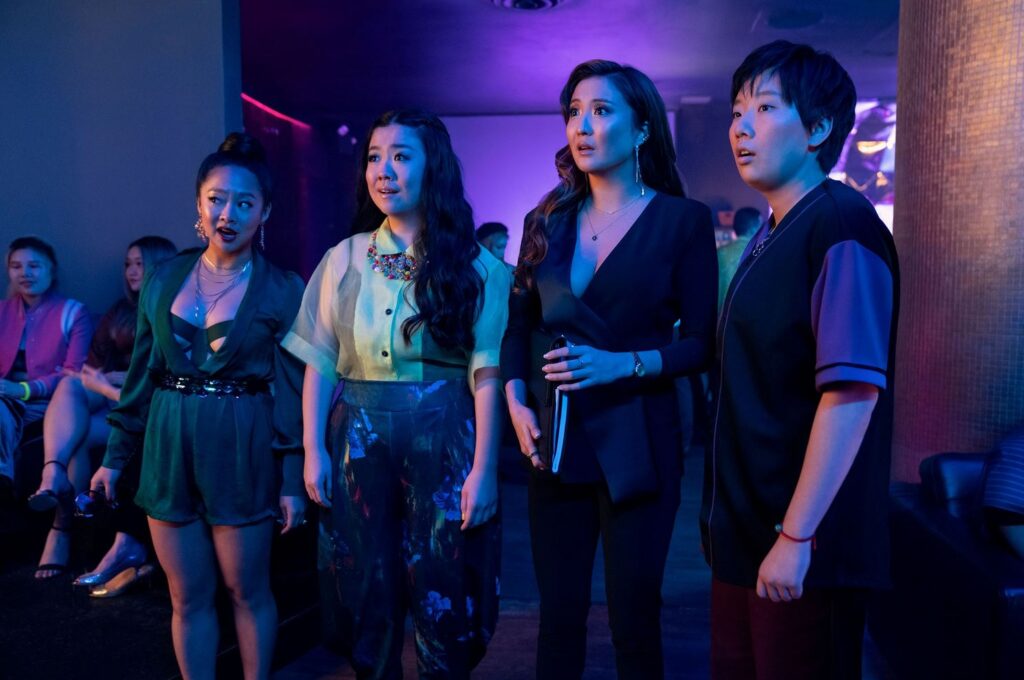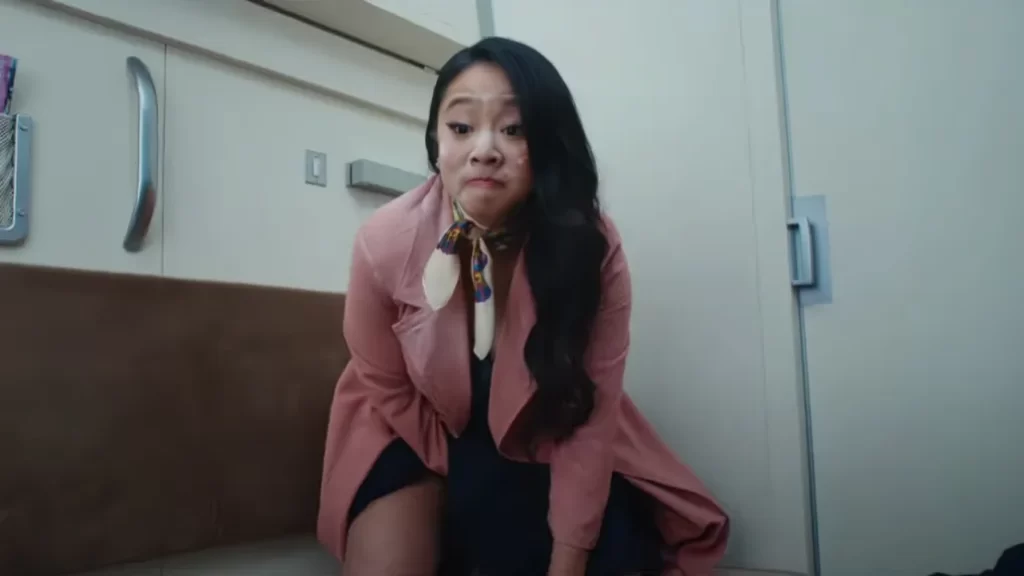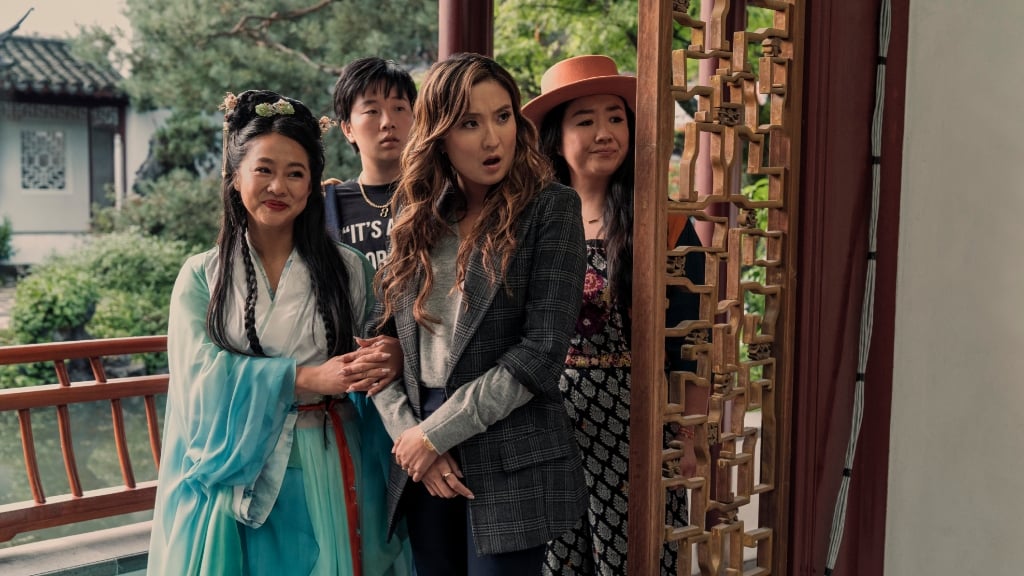
During one of the more outlandish moments in Everything Everywhere All at Once, Stephanie Hsu watches in horror as an adversary attempts to plug a curiously shaped office plaque into his anus. Now in Joy Ride, the new road-trip comedy from Adele Lim, Hsu has transitioned from observer to participant; at one point, circumstances conspire such that she must shove eight plastic baggies filled with cocaine up her own ass.
The sight of a newly minted Oscar nominee frantically thrusting narcotics inside her asshole operates both as its own joke and as the setup for a subsequent, cleverly delayed punch line. (Remember, whenever a character says that the occurrence of a certain event makes her horny, you can be damn sure that event will take place—and in the most compromising scenario possible.) It also encapsulates the movie’s maximalist approach to comedy. Every orifice gets its own moment in Joy Ride, as do K-pop enthusiasts, martial-arts soap operas, Cardi B, projectile vomit, vaginal tattoos, and former NBA All-Star Baron Davis. It’s a lot, and it isn’t ashamed of its own muchness.

Yes, but is it any good? Well, sometimes! I laughed a decent amount while watching Joy Ride, most memorably during a deliriously edited sex montage that finds Hsu operating a Thighmaster with a level of zeal that could best be described as “high-thirst.” I also spent a non-negligible amount of time staring at the screen in either bewilderment or annoyance. If the movie aims for the euphoric high of a drug-fueled night out, it also regularly approximates the resultant lows of a nasty hangover.
Speaking of The Hangover, the premise of Joy Ride—four friends of varying intimacy and maturity must achieve a simple goal, only to encounter countless ribald complications along the way—is pleasingly durable, even if the initial execution here is doubly half-assed. Audrey (Ashley Park) is an associate at a high-powered law firm who’s been tasked to “close the deal” with an Asian client, which requires her to travel to China. (That such a negotiation can’t be consummated remotely is the least of the screenplay’s contrivances.) This simple assignment stimulates complicated feelings for Audrey, a Chinese adoptee with white American parents (the opening scene makes wry use of a Dave Matthews song) who has long wondered about her birth mother. Neither of these angles works; the business element is thoroughly unpersuasive (though Timothy Simons enjoys himself as a boss who’s constantly branding himself an ally), while the well-intentioned adoption piece falls victim to dubious plot twists.

But who cares? The narrative here is mere scaffolding; the point of Joy Ride is to spend time in the company of four funny Asian women whose complementary and conflicting attributes are designed to engender a mix of bedlam, hilarity, and tenderness. Audrey is accompanied by Lolo (Sherry Cola), her longtime best friend and a self-described “sex-positive artist” who’s as laidback as Audrey is driven. (You can guess who lives in whose garage, though Lolo’s ostensible work function here is to provide translation services.) Also in tow is Lolo’s cousin, Deadeye (Sabrina Wu), a socially awkward loner who could probably have been the hero of her own misfit comedy. Rounding out the quartet is Audrey’s former college roommate, Kat (Hsu), now a successful Chinese actress whose abstemious present (“Save some space for Jesus!”) belies her unruly past.
This is a sturdy ensemble, but Lim, a screenwriter (Crazy Rich Asians) making her directorial debut, isn’t quite confident enough to let her actors carry the load. Instead, she revs the movie’s engine into overdrive, careening into set pieces that are sometimes funny, sometimes flabby. When Joy Ride hits—as in a sequence on a train where an ostensibly docile passenger turns into an agent of chaos, or that aforementioned montage at a luxury hotel—it’s a giddy achievement. But when it misses—as during a lengthy stay with Lolo and Deadeye’s grandparents, or an airport sequence that groans through its belabored setup (which is only partially salvaged by a flicker of music-video fantasy)—it wanders in search of laughs or zip.

Thematically, Joy Ride’s main preoccupation is Audrey’s identity crisis—not just in terms of her unfulfilling career, but in the more literal sense as a rootless woman who’s neither racially white nor culturally Asian. It’s thoughtful material, but it’s poorly served by a drippy third act that bypasses thorny questions in favor of sappy speeches and pat resolutions. The movie is more engaging as a portrait of evolving female friendship; Lolo and Kat are implicit rivals for the title of Audrey’s bestie, and the screenplay (by Cherry Chevapravatdumrong and Teresa Hsiao) playfully exploits their id-versus-ego clash while still rounding out their personalities. (As for progressive credentials, one character’s change in pronouns is handled with silent, elegant subtlety.) For her part, Deadeye functions as the film’s moral compass, though Lim never really figures out how to use her.
As recent female-driven comedies go, Joy Ride isn’t as good as No Hard Feelings or Booksmart. But it’s better than underwritten raunch like Girls Trip or Netflix filler like Someone Great. (If you want to stretch back a few decades, it’s dramatically superior to The Sweetest Thing, the risible Cameron Diaz vehicle that erroneously equated the volume of a picture’s bodily fluids with the mass of its humor.) Its cast is appealing, and there are frequent occasions where its more-is-more method pays off. It also demonstrates that, when you try to constantly go full-throttle, you inevitably run out of gas.
Grade: B-
Jeremy Beck is the editor-in-chief of MovieManifesto. He watches more movies and television than he probably should.
